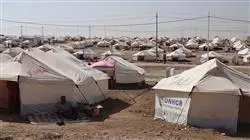University certificate
The world's largest faculty of psychology”
Introduction to the Program
Work in the most disadvantaged regions must start by promoting human and sustainable development. It is the best way to achieve progress in societies"

Development cooperation has been changing in its objectives, approach, methods and strategies, in search of a greater impact on the transformation of reality. In addition, it has become a professional sector that bases its actions on scientific models for understanding development that have been proposed over time. Currently, development cooperation cannot be understood without a model based on sustainability and in which all the agents involved are aware of it.
Public and private organizations working in the field of International Cooperation base their work on the Human and Sustainable Development of populations with fewer resources. With this program we want to train psychologists in effective and quality work in this area to achieve real progress in these societies.
The objective of this Postgraduate diploma is to increase the skills of Psychologist who wish to develop their professional work in the field of international cooperation, promoting human and sustainable law. To this end, this program combines basic knowledge in international cooperation and development applied to the field of Psychology, tools that allow the development worker to seek to improve the performance of their functions in those areas that people and communities demand, orienting them to change and focusing them on the present situation through the tools and resources of cooperation. A program with a high theoretical content, but in which the students will find numerous practical examples and educational material that will allow them to face real situations in a simulated way.
In addition, as it is a 100% online program, the Psychologist will be able to combine the study of this comprehensive Postgraduate diploma with the rest of their daily obligations, choosing at all times where and when to study. A high-level program that will take these professionals to the highest level in their field.
A high-level educational program created by the best experts in the field, which will allow you to achieve professional success"
This Postgraduate diploma in Human and Sustainable Development in Psychology contains the most complete and up-to-date scientific program on the market. The most important features of the include:
- Practical cases presented by experts in International Development Cooperation
- The graphic, schematic, and practical contents with which they are created provide scientific and practical information on the disciplines that are essential for professional practice
- New developments on Human and Sustainable Development
- Practical exercises where the self-assessment process can be carried out to improve learning
- Emphasis on innovative methodologies in International Development Cooperation
- Theoretical lessons, questions to the expert, debate forums on controversial topics, and individual reflection assignments
- Content that is accessible from any fixed or portable device with an Internet connection
This Postgraduate diploma is the best investment you can make in the selection of a refresher program for two reasons: in addition to updating your knowledge in Human and Sustainable Development in Psychology, you will obtain a qualification from the leading online university. TECH Global University”
The program’s teaching staff includes professionals from sector who contribute their work experience to this educational program, as well as renowned specialists from leading societies and prestigious universities.
Its multimedia content, developed with the latest educational technology, will provide the professional with situated and contextual learning, i.e., a simulated environment
that will provide an immersive education programmed to learn in real situations.
The design of this program focuses on Problem-Based Learning, by means of which the professional must try to solve the different professional practice situations that are presented throughout the academic course. For this purpose, the student will be assisted by an innovative interactive video system created by renowned experts.
Increase your decision-making confidence by updating your knowledge with this Postgraduate diploma"

Take the opportunity to learn about the latest advances in this field and apply it to your daily practice"
Why study at TECH?
TECH is the world’s largest online university. With an impressive catalog of more than 14,000 university programs available in 11 languages, it is positioned as a leader in employability, with a 99% job placement rate. In addition, it relies on an enormous faculty of more than 6,000 professors of the highest international renown.

Study at the world's largest online university and guarantee your professional success. The future starts at TECH”
The world’s best online university according to FORBES
The prestigious Forbes magazine, specialized in business and finance, has highlighted TECH as “the world's best online university” This is what they have recently stated in an article in their digital edition in which they echo the success story of this institution, “thanks to the academic offer it provides, the selection of its teaching staff, and an innovative learning method aimed at educating the professionals of the future”
A revolutionary study method, a cutting-edge faculty and a practical focus: the key to TECH's success.
The most complete study plans on the university scene
TECH offers the most complete study plans on the university scene, with syllabuses that cover fundamental concepts and, at the same time, the main scientific advances in their specific scientific areas. In addition, these programs are continuously being updated to guarantee students the academic vanguard and the most in-demand professional skills. In this way, the university's qualifications provide its graduates with a significant advantage to propel their careers to success.
TECH offers the most comprehensive and intensive study plans on the current university scene.
A world-class teaching staff
TECH's teaching staff is made up of more than 6,000 professors with the highest international recognition. Professors, researchers and top executives of multinational companies, including Isaiah Covington, performance coach of the Boston Celtics; Magda Romanska, principal investigator at Harvard MetaLAB; Ignacio Wistumba, chairman of the department of translational molecular pathology at MD Anderson Cancer Center; and D.W. Pine, creative director of TIME magazine, among others.
Internationally renowned experts, specialized in different branches of Health, Technology, Communication and Business, form part of the TECH faculty.
A unique learning method
TECH is the first university to use Relearning in all its programs. It is the best online learning methodology, accredited with international teaching quality certifications, provided by prestigious educational agencies. In addition, this disruptive educational model is complemented with the “Case Method”, thereby setting up a unique online teaching strategy. Innovative teaching resources are also implemented, including detailed videos, infographics and interactive summaries.
TECH combines Relearning and the Case Method in all its university programs to guarantee excellent theoretical and practical learning, studying whenever and wherever you want.
The world's largest online university
TECH is the world’s largest online university. We are the largest educational institution, with the best and widest online educational catalog, one hundred percent online and covering the vast majority of areas of knowledge. We offer a large selection of our own degrees and accredited online undergraduate and postgraduate degrees. In total, more than 14,000 university degrees, in eleven different languages, make us the largest educational largest in the world.
TECH has the world's most extensive catalog of academic and official programs, available in more than 11 languages.
Google Premier Partner
The American technology giant has awarded TECH the Google Google Premier Partner badge. This award, which is only available to 3% of the world's companies, highlights the efficient, flexible and tailored experience that this university provides to students. The recognition as a Google Premier Partner not only accredits the maximum rigor, performance and investment in TECH's digital infrastructures, but also places this university as one of the world's leading technology companies.
Google has positioned TECH in the top 3% of the world's most important technology companies by awarding it its Google Premier Partner badge.
The official online university of the NBA
TECH is the official online university of the NBA. Thanks to our agreement with the biggest league in basketball, we offer our students exclusive university programs, as well as a wide variety of educational resources focused on the business of the league and other areas of the sports industry. Each program is made up of a uniquely designed syllabus and features exceptional guest hosts: professionals with a distinguished sports background who will offer their expertise on the most relevant topics.
TECH has been selected by the NBA, the world's top basketball league, as its official online university.
The top-rated university by its students
Students have positioned TECH as the world's top-rated university on the main review websites, with a highest rating of 4.9 out of 5, obtained from more than 1,000 reviews. These results consolidate TECH as the benchmark university institution at an international level, reflecting the excellence and positive impact of its educational model.” reflecting the excellence and positive impact of its educational model.”
TECH is the world’s top-rated university by its students.
Leaders in employability
TECH has managed to become the leading university in employability. 99% of its students obtain jobs in the academic field they have studied, within one year of completing any of the university's programs. A similar number achieve immediate career enhancement. All this thanks to a study methodology that bases its effectiveness on the acquisition of practical skills, which are absolutely necessary for professional development.
99% of TECH graduates find a job within a year of completing their studies.
Postgraduate Diploma in Human and Sustainable Development in Psychology
Enhance your knowledge and become an agent of change for a more sustainable world. At TECH Global University we offer you the opportunity to specialize in the field of Human and Sustainable Development through our Postgraduate Diploma program. Our online classes are the ideal platform to access a quality education from the comfort of your home. Take advantage of the flexibility that online classes give you and organize your time according to your needs. At our educational institution we are proud to offer you specialized and updated academic content. Our Postgraduate Diploma program in Human and Sustainable Development in Psychology focuses on providing you with the knowledge necessary to understand the challenges and opportunities presented by sustainable development in the 21st century. The graduate program focuses on giving you the tools to understand the relationship between complete human development and the possibility of making our coexistence with the ecosystem that exists on the planet more sustainable.
Help create sustainable environments for all
In the postgraduate program you will explore topics such as sustainable planning and management of natural resources, the promotion of social and gender equity, and the promotion of responsible business practices. You will also acquire skills to design and evaluate policies and projects that contribute to sustainable development in different contexts. Our team of professors, experts in the field of sustainable development, will guide you in your learning process and provide you with the necessary tools to become a professional committed to human welfare and environmental care. Get the Postgraduate Diploma in Human and Sustainable Development in Psychology, endorsed by TECH Global University, and make a difference in the field of sustainable development. Enroll today and start building a more sustainable future for all!







